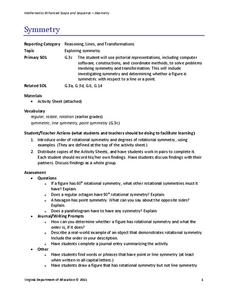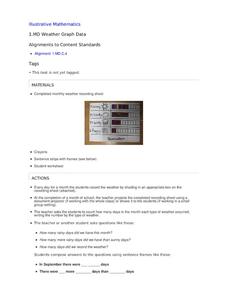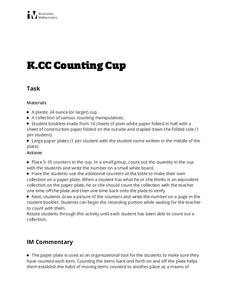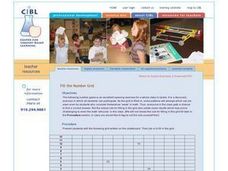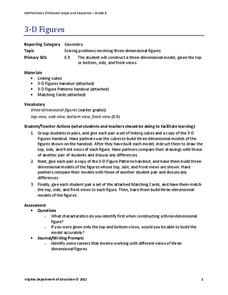Illustrative Mathematics
Velocity vs. Distance
At the end of this activity, your number crunchers will have a better understanding as to how to describe graphs of velocity versus time and distance versus time. It is easy for learners to misinterpret graphs of velocity, so have them...
Curated OER
Patterns in the Multiplication Table
Explore patterns in the multiplication table in order to deepen your third graders' understanding of this essential skill. Implement this activity as a whole-class lesson, allowing students to work in pairs or small groups to support...
02 x 02 Worksheets
Symmetry
Get learners' minds rotating and reflecting while looking for symmetry. Pupils investigate figures to determine the number of lines of symmetry and if the figure has rotational symmetry. Classmates work together in groups to find out the...
Curated OER
Speed
Fifth and sixth graders practice working in pairs to determine whether they can walk with constant speed. They test themselves, collect their data, draw graphs with their data collected, manipulate the data, and then draw conclusions...
Illustrative Mathematics
“One More” Concentration
Help your primary learners develop an understanding of the concept of one more and one less using two sets of number cards. The first set of cards, all in one color, is the "one less" deck. The second set, again all in one specific...
Illustrative Mathematics
Representing Half of a Circle
Geometric shapes make great visual models for introducing young mathematicians to the concept of fractions. Looking at a series of four circles, students are asked to determine whether or not one half of each circle is shaded. To support...
Illustrative Mathematics
Weather Graph Data
Teaching young mathematicians about collecting and analyzing data allows for a variety of fun and engaging activities. Here, children observe the weather every day for a month, recording their observations in the form of a bar graph....
Virginia Commonwealth University
General Construction Measurement and Dimensions
Learners construct their understanding of measurement and dimensions in this step-by-step approach that begins with an all group vocabulary introduction, consisting of measuring objects and dialoging using measurement vocabulary....
Beacon Learning Center
Ten Pins
Multiplying with multiples of 10, 100, and 1,000 provides an opportunity to discuss patterns that arise with zeros. The class uses these patterns to solve problems. Then they rotate through three work stations, including a computer-based...
Curated OER
Exploring Number Systems
Students work in a group to prepare a poster about a new number system. They research a variety of number systems, create new symbols for their original number system and develop a tutorial for the class.
Curated OER
Maximize area
For this subscription-based activity, algebra learners model changes in the length and width of a rectangle to determine the maximum area possible for a given perimeter and solve several application problems involving area, included in...
Curated OER
Making Simple Conversions
Young scholars explore the concept of measurement as it relates to equivalencies. They complete simple conversions using visual models of measurement units, and record their answers in a two-column table.
Illustrative Mathematics
Assessing Writing Numbers
Can I say a number by its name, and can you write it for me? Working in small groups or with the whole class, give your kindergartners a piece of 1-inch graph paper and have them write numbers 0 to 10 and 11 to 20. Next, pass out blank...
Illustrative Mathematics
Counting Cup
Help your kindergartners develop counting skills using a 24 oz. plastic cup, counting manipulatives, and a paper plate. Start with a small group of learners and place a quantity of counting objects between the range of 5 to 10 into each...
Curated OER
Find 1
Extend your class's ability to represent unit fractions on a number line with this challenging worksheet. Given two number lines, one labeled with zero and 1/4, the other with zero and 5/3, learners must accurately locate the number one...
Kentucky Department of Education
Multi-Digit Multiplication Strategies
There is more than one way to solve a multiplication problem, and many learners find that the lattice multiplication method can be a helpful one. Fourth graders take an initial formative assessment before working in groups of two or...
Curated OER
Balloon Bop: Skip Counting
Practice counting in patterns and skip counting by 1, 5, and 10. Once the patterns have been taught, teams of 5 or 6 learners -- holding hands in circles -- skip count each time they collectively bounce a balloon up into the air. Early...
Curated OER
Multiplying With Nine As A Factor
Elementary math minds complete various activities to memorize the multiples of nine. They watch a PowerPoint presentation and demonstrate the finger trick. Unfortunately the link to the multiplication activities does not take you...
Curated OER
Fill the Number Grid
Patterns emerge as the class works together to fill in a number grid. This whole group activity is designed to make all learners feel successful, and ultimately turns into a lesson on the least common multiple.
Curated OER
Coco Locomotion
Technology tutees read a description about coconuts and how they are used to make biodiesel fuel. Note that the link to the article does not work, and the article does not appear to be available online. There are, if you look for one,...
Virginia Department of Education
3-D Figures
Scholars construct three-dimensional figures to study dimension and side views. Learners build models using linking cubes to match views of different sides. After practicing with models, they attempt to match three-dimensional drawings...
Kenan Fellows
Weight and Balance of an Airplane
A career in aeronautics might be calling your class members. Building from the previous two lessons in the series, learners continue analyzing the mathematics of aeronautics. Groups create a paper airplane using paperclips for balance....
Curated OER
Put Your Truss in Building Bridges
Students apply abstract concepts, such as stress, fulcrums, the law of gravity, and the strength of different geometric shapes. Groups of student contractors operate simulated architectural firms to create strong, economical bridges.
Curated OER
Tiling the Classroom
Students see how to identify regular polygons, how to slide, turn and flip polygons, and why certain polygons tessellate better than others. Groups create a one foot square design to be used to tile the classroom. Great lesson!




